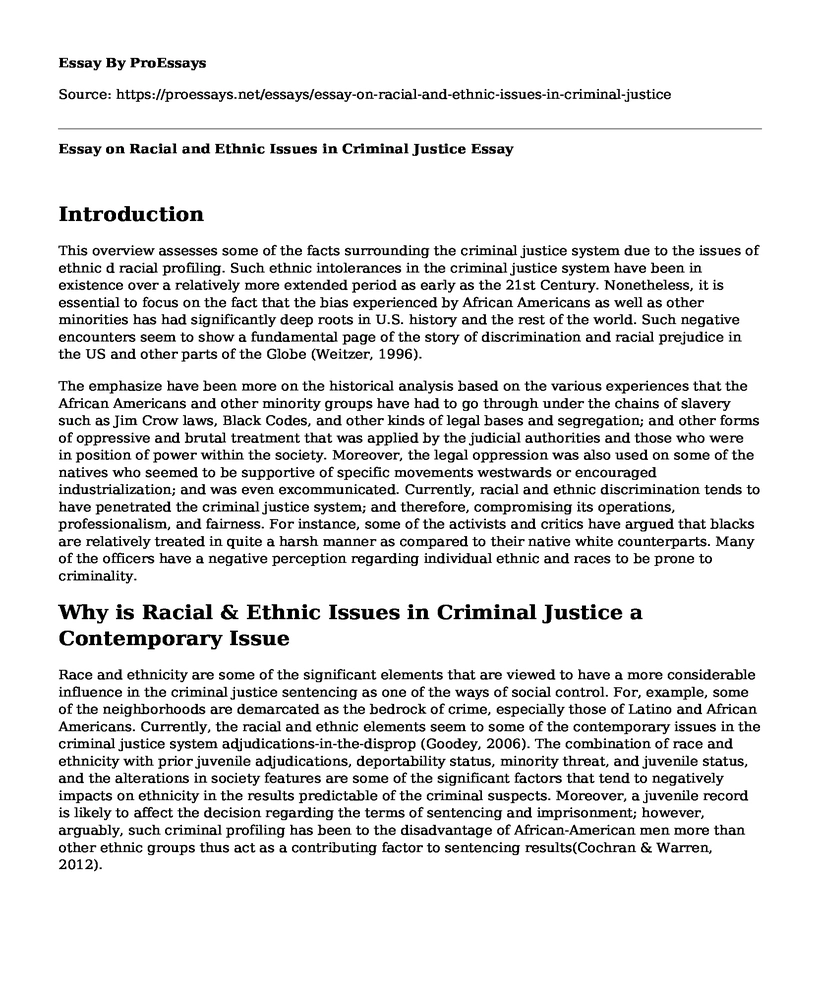Introduction
This overview assesses some of the facts surrounding the criminal justice system due to the issues of ethnic d racial profiling. Such ethnic intolerances in the criminal justice system have been in existence over a relatively more extended period as early as the 21st Century. Nonetheless, it is essential to focus on the fact that the bias experienced by African Americans as well as other minorities has had significantly deep roots in U.S. history and the rest of the world. Such negative encounters seem to show a fundamental page of the story of discrimination and racial prejudice in the US and other parts of the Globe (Weitzer, 1996).
The emphasize have been more on the historical analysis based on the various experiences that the African Americans and other minority groups have had to go through under the chains of slavery such as Jim Crow laws, Black Codes, and other kinds of legal bases and segregation; and other forms of oppressive and brutal treatment that was applied by the judicial authorities and those who were in position of power within the society. Moreover, the legal oppression was also used on some of the natives who seemed to be supportive of specific movements westwards or encouraged industrialization; and was even excommunicated. Currently, racial and ethnic discrimination tends to have penetrated the criminal justice system; and therefore, compromising its operations, professionalism, and fairness. For instance, some of the activists and critics have argued that blacks are relatively treated in quite a harsh manner as compared to their native white counterparts. Many of the officers have a negative perception regarding individual ethnic and races to be prone to criminality.
Why is Racial & Ethnic Issues in Criminal Justice a Contemporary Issue
Race and ethnicity are some of the significant elements that are viewed to have a more considerable influence in the criminal justice sentencing as one of the ways of social control. For, example, some of the neighborhoods are demarcated as the bedrock of crime, especially those of Latino and African Americans. Currently, the racial and ethnic elements seem to some of the contemporary issues in the criminal justice system adjudications-in-the-disprop (Goodey, 2006). The combination of race and ethnicity with prior juvenile adjudications, deportability status, minority threat, and juvenile status, and the alterations in society features are some of the significant factors that tend to negatively impacts on ethnicity in the results predictable of the criminal suspects. Moreover, a juvenile record is likely to affect the decision regarding the terms of sentencing and imprisonment; however, arguably, such criminal profiling has been to the disadvantage of African-American men more than other ethnic groups thus act as a contributing factor to sentencing results(Cochran & Warren, 2012).Remedies to Ethnic and Racial Discrimination in the Criminal Justice System
The Committee on the Elimination of Racial Discrimination (CERD) has currently made several attempts in eradicating the vices by engaging in some of the campaigns and prevention of international human rights code of conducts; thus ensuring that everyone is treated on equal grounds before the criminal justice system regardless of the ethnic or radical groupings. Reports to CERD tends to increasingly reliable and effective strategy in the determination of constant challenges of racial and ethnic intolerance within the criminal justice system and provides several recommendations on how to address such menace. Moreover, recognition of country reports by CERD has significantly helped the human rights society to acknowledge and tackle specific types of racial discrimination. Again, the states have embarked on training of police officers on how to eliminate racial profiling based on criminal acts.
References
Ulmer, J. T., & Laskorunsky, J. A. (2016). The role of juvenile adjudications in the disproportional incarceration of African-American and Hispanic defendants. Journal of crime and justice, 39(1), 9-27. https://pennstate.pure.elsevier.com/.../the-role-of-juvenile-adjudications-in-the-disprop...
Goodey, J. (2006). Ethnic profiling, criminal (in) justice and minority populations. Critical criminology, 14(3), 207-212. ps://www.researchgate.net/.../225331480_Ethnic_Profiling_Criminal_In_Justice_and_...
Cochran, J. C., & Warren, P. Y. (2012). Racial, ethnic, and gender differences in perceptions of the police: The salience of officer race within the context of racial profiling. Journal of Contemporary Criminal Justice, 28(2), 206-227. https://www.ncjrs.gov/App/Publications/abstract.aspx?ID=262963
Weitzer, R. (1996). Racial discrimination in the criminal justice system: Findings and problems in the literature. Journal of Criminal Justice, 24(4), 309-322. https://www.sciencedirect.com/science/article/pii/0047235296000153
Thornberry, P. (2005). Confronting racial discrimination: a CERD perspective. Human Rights Law Review, 5(2), 239-269.
Cite this page
Essay on Racial and Ethnic Issues in Criminal Justice. (2022, Mar 24). Retrieved from https://proessays.net/essays/essay-on-racial-and-ethnic-issues-in-criminal-justice
If you are the original author of this essay and no longer wish to have it published on the ProEssays website, please click below to request its removal:
- Essay Example on Violence in the Media
- Research Paper on Dependence Between the Budget and Immigration in US
- The Expedited Death Penalty - Essay Sample
- Essay Example on PopCult and PostFem: Attitudes and Influences
- Paper Sample on Preserving Privacy in Healthcare: Encouraging and Monitoring Patient Information
- Paper Example on US Drone Strikes: Targeting Terrorists Beyond War Zones
- Essay Example on Racial and Cultural Division in America: George Floyd and Beyond







